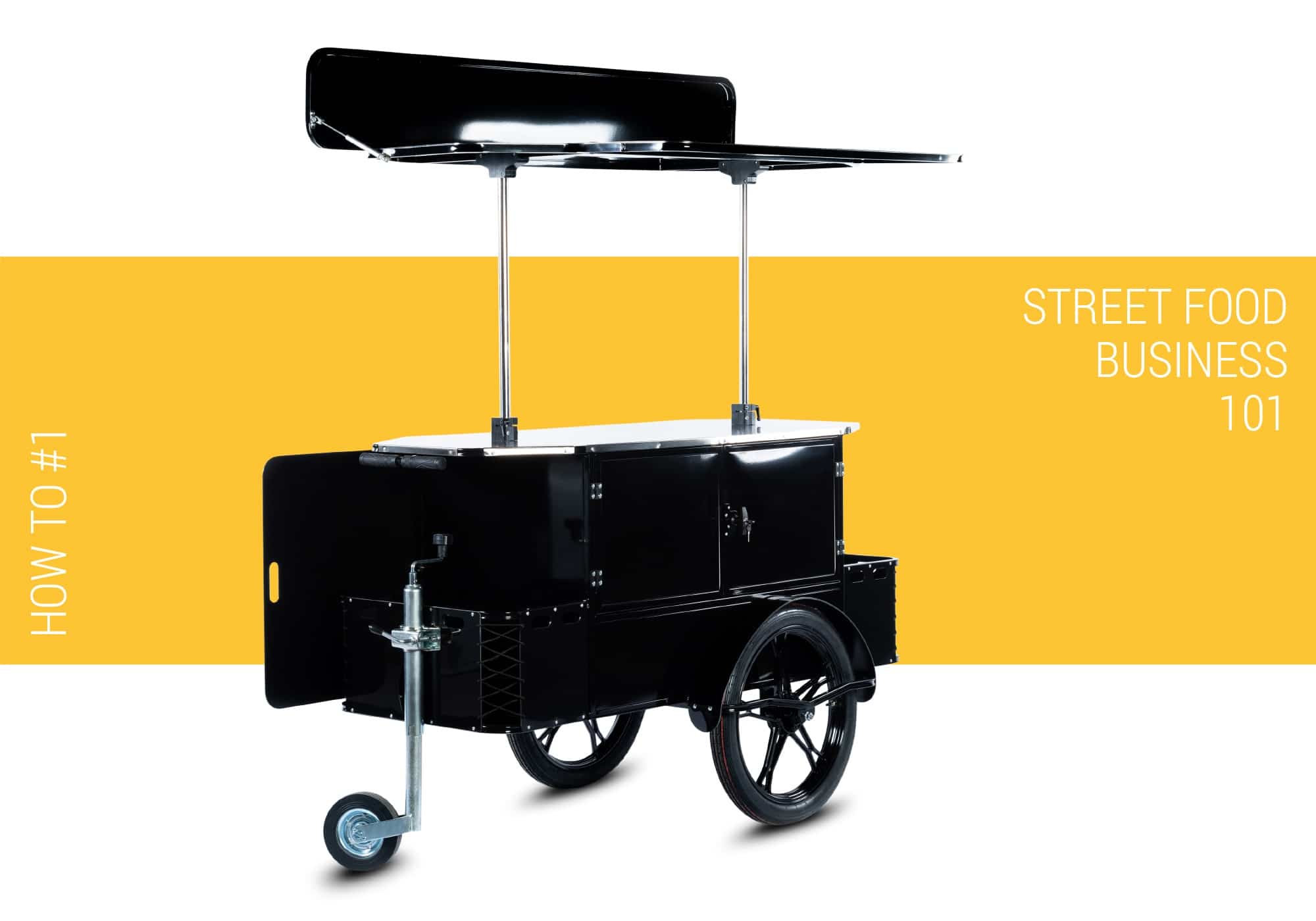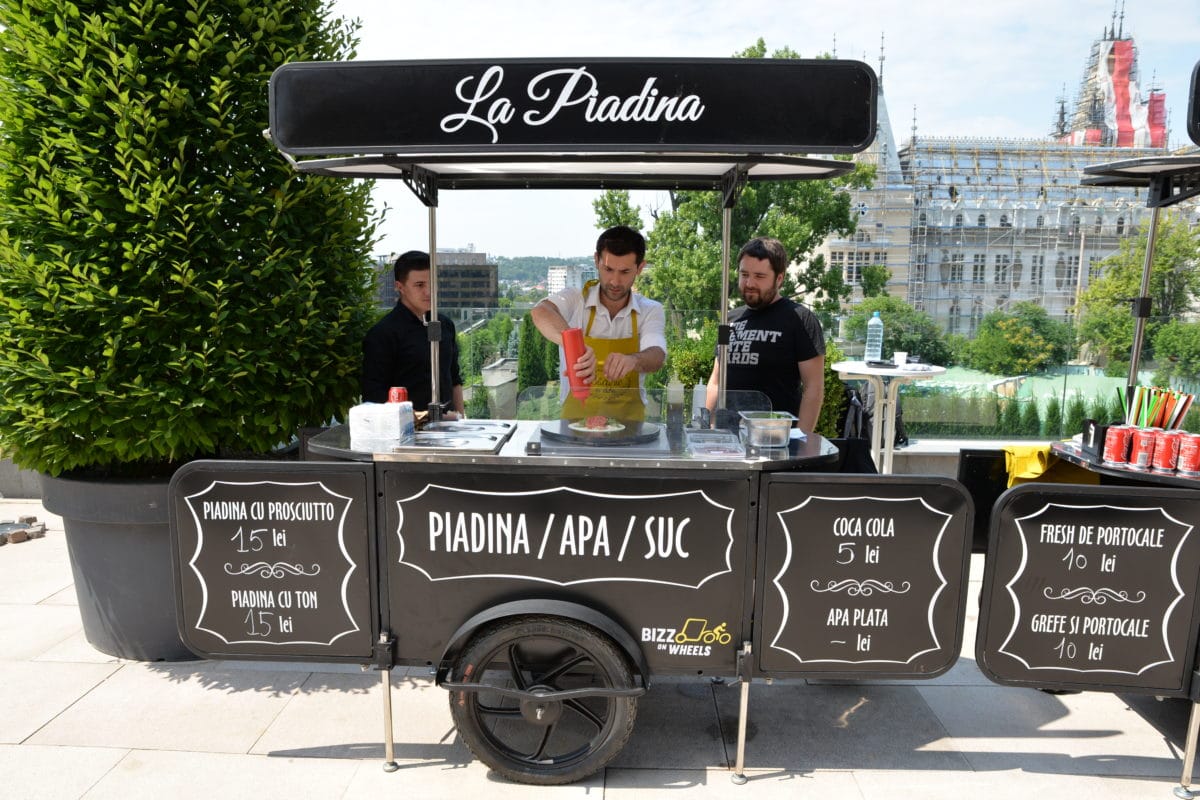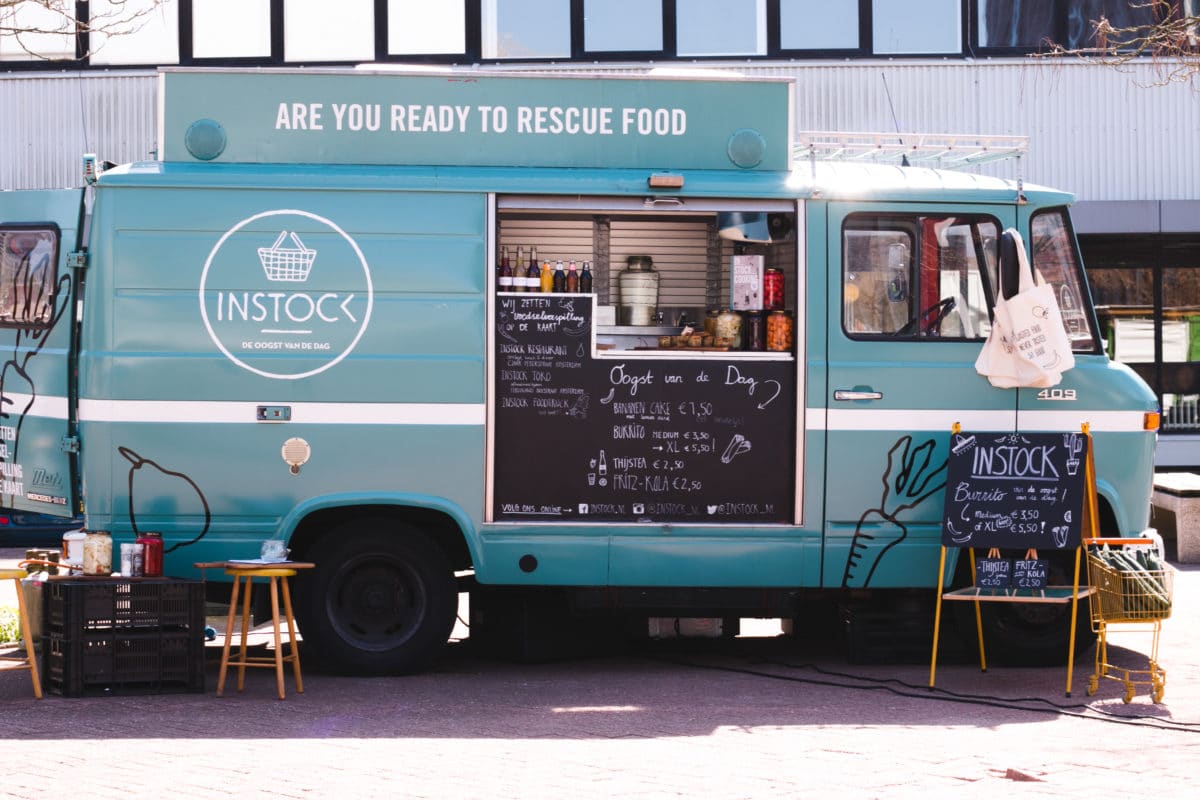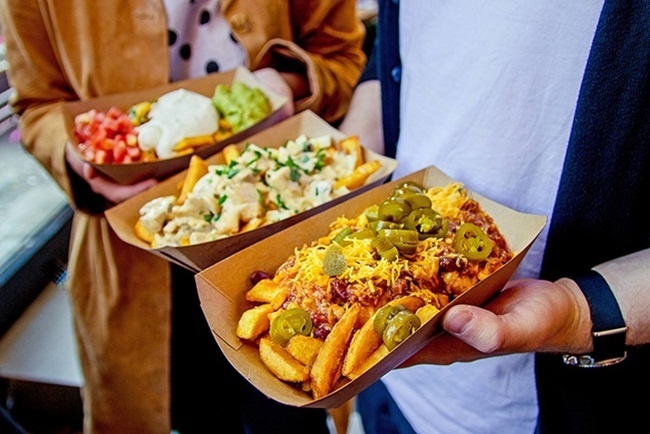How to Start a Food Cart Business: a Step-by-Step Guide for Beginners & Entrepreneurs

[Last Updated: January 2021]
Wondering how to start a food cart business?
The timing couldn’t be better: it seems that the street food craze is sweeping the world.
From bustling cities to small towns, food on wheels is a growing trend. And it’s not just drawing street food fans, it’s bringing in big bucks too: according to Intuit, the street-food business, including food trucks and mobile food carts, is a $2.7 billion industry that has seen a 12.4% growth in the last 5 years alone!
Traders are encouraged by the growing number of urban street markets, private events and street food festivals, while the entire trend is supported by the global rise of the “foodie” culture, making the public increasingly open to new taste experiences and quality cuisine.
Which begs the question:
What Makes Street Food So Popular?

Some claim that the street food trend is booming as a direct consequence of the slow-growing economy. Time is also a factor. More and more people are seeking breakfasts and lunches that are inexpensive, quick and delicious.
From the entrepreneur’s perspective, street food comes with important benefits such as low start-up costs and mobility. Kiosks, food carts, trailers, and food trucks have a lower overhead than restaurants and can be moved if one location does not generate enough business.
For customers, street food is convenient and cost-friendly, which makes it attractive for basically everyone: locals and tourists, students and busy professionals, frugal singles and large families.
The most popular street foods?
There are the classics: hot dogs, hamburgers, ice cream and doughnuts.
Then there are those inspired by ethnic cuisines such as tacos, empanadas, sushi and crepes. The possibilities are endless and it’s up to you, the entrepreneur, to find the dishes and recipes that will set you apart from the rest and, most importantly, that will help you build a good reputation and a loyal customer base.
But, before you decide what foods you’re going to sell, you’ll have to consider:
The PROs and CONs of a Food Cart Business
There are many advantages to starting your own food cart business, which is why a lot of people choose to do just that. The PROs include:
- Low start-up costs
- Less risky than opening up a restaurant
- The ability to be your own boss
- The flexibility to work when and where you want
- Little restaurant experience required
- The growing popularity of the street food trend
But, as with all business endeavours, there are also CONs to examine. A food cart business is no walk in the park: there’s a lot of hard work to be done and you’ll only see significant profits after your business picks up.
The biggest CONs are:
- Being self-employed can be testing for some
- Long hours, early mornings and night shifts required
- Fierce competition
- There are many regulations and laws to comply with
- Seasonal reliance
- Finding a suitable location that you’re allowed to trade in
- Customer service can be challenging if you’re a solo-preneur
From our experience as food carts manufacturers, people are attracted by affordable start-up costs and by flexibility; at the same time, the most common complaints – at least in the initial phase – are long working hours and industry volatility in terms of trends and business opportunities.
However, if you are passionate about good food and you start with solid and well-researched plan, there is every chance you could make a roaring success of your food cart start-up.
How to Start a Mobile Food Cart Business? A Step-by-Step Guide

First Step: Market Research
Market research involves finding out the “who, what, where, why and when” of your business, and while it’s not the most exciting part of your endeavour, it’s certainly an essential one.
It can be risky and even silly to assume that you already know the answers to these questions and then get caught out later on.
Here’s what you need to address at this stage:
Operational
- Where will you set up your food cart business?
- When will you open to ensure the best business?
- How will the weather affect your trade?
Target Market
- Who are your customers? What is their demographic?
Competition
- Is there any competition? What do they offer?
Locations & Business Opportunities
Finding a couple of great locations will play a major factor in your success and it depends on several key factors:
- Where you’re allowed to park by law
- Where the customers are
- The prime hours for each location
- Competition
Some great places and opportunities to consider for trading are:
- Office parks
- The business district
- Empty lots
- Shopping districts or malls
- Popular tourist locations
- Sports venues
- Parks and beaches
- Bus and train stations
- College campuses
- Festivals and events
- Conferences and conventions
- Private events (weddings, birthdays, etc)
- Corporate events
Most of these locations will require permits and/or owner agreements, so make sure to check with your local authorities & institutions beforehand.
When it comes to festivals, events, conferences and conventions the best thing to do is to get in touch with organizers and lease your space well in advance.
Determining Your Food Cart Business Legal Requirements
You’ve probably noticed that most How-To guides on this subject place sorting out the legal requirements at the bottom of their To-Do list.
And here’s why: the permits and licensing requirements for food cart businesses vary from country to country, state to state, and even city to city, so making a definitive list with everything you need is close to impossible.
Only your local Health Department can provide you with the information that applies in your case.
At this stage, you’ll address issues such as:
- The street food vending regulations in your city
- Licenses and permits required
- The types of food you’ll be selling and how they’re handled, stored, thawed, and cooked
- Commissary requirements (the requirement to operate from a licensed commercial kitchen)*
- The size, make and the equipment of your street food vehicle
- The vehicle’s fresh water and waste water holding capacity
- Safe food handling course requirement
- Hygiene policies
- Pre-approval inspection of the equipment
* Most municipalities don’t allow food vendors to operate a food cart business from a residential kitchen and they require the use of a commissary – a licensed and inspected commercial kitchen.
Vendors have to report to the commissary each day of operation to prepare the food that will be served from the cart and to clean the vehicle’s equipment at the end of the day.
If you are selling prepackaged foods, you are not considered a food handler and may have less stringent requirements than if you are actually preparing foods or even scooping ice cream.
But as long as food is unwrapped, you are typically considered to be a food handler and must meet specific regulations.
While your cart or truck manufacturer will not know the nuances of each city’s requirements, they can usually help you meet specific health standards.
For example, all of our food carts are manufactured using food-grade materials for countertops and other parts/areas where food may be stored and prepared.
In addition, we work closely with each of our clients to adapt the carts’ cooking & water systems so they will meet all the health and safety standards specific to the vendor’s area.
Getting all the trading, health and safety qualifications in order will not only allow you to operate legally (and avoid hefty fines), but it will also help enforce the public’s hard earned perception that that those running a street food business are doing their utmost to meet and surpass sanitary requirements.
Basically, your legal status and reputation are on the line.
In addition to the food service permits and health requirements, you may also need to apply for:
- Business license
- State sales tax permit
- Truck/cart registration
To sort these out, the city hall or the county clerk’s office will usually point you in the right direction.
Keep in mind that before you can hit the road, health inspectors will check your vehicle. Usually, they look for:
- Proof of ownership, proper identification and license (of the vehicle)
- Proof of District-issued Food Manager Identification Card
- Food-purchase record storage and record keeping
- That your depot, commissary or service support facility meets your vending unit operation needs
- Copy of license for the service support facility and/or a recent inspection report
Food vehicles are typically inspected at least once a year by a health department inspector, sometimes randomly.
The inspector checks to see how food is stored so that it does not spoil and that it is kept at the proper temperature. All food equipment as well as sinks and water supplies are checked.
Commercial kitchens and garages in which food vehicles are kept are also inspected frequently and can be given high fines if they do not meet health and fire codes.
Some have been shut down because of too many violations. Likewise, trucks and carts have lost their licenses over repeated violations.
Editor’s Note: if you want to learn more about what it takes to launch a business, from a more general perspective, here’s a great resource to get you started: How To Start A Business: A Complete Playbook
Choosing Your Street Food Business Platform/Vehicle
Mobile street food businesses come in a variety of shapes and sizes, and deciding which is the right one for you depends on your:
- Start-up budget
- Time commitment
- Vision and the ability to fulfill it
- Experience at running a business
- Target demographic
Your options are: food stands, food carts, concession trailers and food trucks. Each of them has its own unique benefits as well as some disadvantages:
Food Stands
Food stands are essentially booths or stalls that are either temporary or mobile, and are used to sell everything from quick snacks such as bagels, pretzels and ice cream, to more elaborate meals.
Most food stands are usually operated indoors and they are an excellent choice in areas where outdoor selling is limited by cold or unpleasant weather.
Pros: low start-up and running costs, flexibility.
Cons: limited trading areas, limited inventory.
Mobile Food Carts

Food carts have been around for decades and they are one of the most cost-effective ways to start a mobile food business.
Pros: affordable, easy to customize, easy to move between locations (they can be pulled by a bicycle/car or pushed by hand), easy to park, easy to maintain, suitable for both indoor and outdoor use, may require less licensing than a food truck.
Cons: not too much space for preparing elaborate dishes.
Concession Trailers
Same as food carts, concession trailers have been around for a long time and are often found at fairs, carnivals and sporting events.
Pros: low overhead costs compared to food trucks, more space for cooking.
Cons: more difficult to move between locations, require bigger parking space both on/off-duty, involve higher operating costs.
Food Trucks

Very popular among seasoned street food vendors, food trucks can carry more food and handle more business than vending carts and concession trailers, but they also involve much higher start-up and running costs.
Pros: more room for cooking and storing food which allows for more items on the menu, higher profits, increased mobility.
Cons: high start-up and running costs, require more maintenance than food carts, bigger parking space both on/off-duty, more licensing than a food cart.
We believe food carts are the best choice, especially for first-time entrepreneurs. Their size, mobility and low running costs make them ideal for starting a profitable food cart business with the potential to grow and expand at a rapid pace.
Are Food Carts Profitable?
A food cart business can be very lucrative right from the start; however, this depends on many factors such as location, footfall, weather, product type etc.
According to our customers, if you can secure a good location for your business, you can expect between 100 to 400 customers per day (during weekends, festivals and public events), bringing in anywhere from $500 to $3,000 daily.
Choosing Your Concept, Menu & Suppliers

Gone are the days of the basic street food stall. Today, most street food vendors don’t actually sell food – they sell a concept.
Whether they’re food carts, concession trailers or food trucks, most successful street food businesses out there have themes or concepts that are consistently reflected in all their elements: exterior design, branding, menus and recipes.
Your concept should be a means of distinguishing you from your competition and building your niche market. And, if you get it right, it can even draw media attention to your business.
This brings us to menu planning. Choosing what kind of food you’ll prepare and sell can be a fun task, and if you look at the carts, trailers and trucks operating on the streets, you’ll find that almost anything edible can be served as street food.
But there are a lot of factors to consider when it comes to menu planning, such as:
- What foods do you know how to cook?
- What foods do you enjoy cooking?
- What are the most popular foods in your area?
- What foods can you prepare relatively fast, repeatedly and without difficulty?
- What foods could your customers take with them easily?
- What foods have a good profit margin?
- What times of day will you be open for business?
- What are you going to specialize in?
- How many items will your menu have?
- Where are you going to get the ingredients from?
After deciding on the type of food you’re going to sell, it’s time to start working on recipes and experiment with various ingredients.
Once you’ve found a few favourites, test them on your friends and family first. Don’t be afraid or dismissive of criticism: it’s better to receive it from them.
The bottom line is, don’t start out with foods you have not thoroughly tested. This means you need to perfect each recipe to be sure it has the following qualities:
- It tastes consistently good
- It’s easy to make repeatedly in large quantities.
- It’s easy to serve
- It’s easy to store & carry
Next in line is figuring out your sourcing – where will you buy your ingredients from?
Sourcing your food can be an important factor in planning your purchases, schedule and menu items.
Common sources include wholesale food distributors, food manufacturers, local and regional suppliers, green markets and farmers markets.
Determining the right quantities is another matter that you’ll need to deal with, initially by trial and error. If you have the time, spend a couple of hours observing the street food vendors in your area. How many customers do they have per hour? When’s their busiest period? This will help you estimate a potential sales volume, which you can use to draft your shopping list.
Pay special attention to foods and ingredients that lose their freshness quickly; learn which are the items you can safely keep throughout the day and how many of them you can sell before they go bad.
Creating Your Food Cart Business Plan
Despite the low start-up costs involved, jumping in to street food without any kind of plan is a sure-fire recipe for disaster. The space is extremely competitive, and you need to have a very clear idea of the niche you plan to fill before taking the plunge.
Writing a business plan isn’t a complicated job and it doesn’t have to be very long. Keep it concise, to the point and ensure that you cover each of the following topics:
- Your business’s name
- Business management: who’s going to be in charge?
- Your mission statement: in one sentence, summarize the aim of your street food business.
- Your vehicle: are you going to use a stall, a cart, a trailer or a truck?
- Start-up costs: what do you need to buy to get started? What fees to you need to pay in advance?
- The daily operational costs: how much will you spend on ingredients and what are the overhead costs on a weekly or monthly basis?
- Funding and financial projections; where do you plan to get the money from to start the business and what are your projected profits/losses for the next month, year, 2 years etc? How will you maintain the cash-flow?
- Your schedule: will you work on the business full-time or alongside your day job?
- What’s your main competition and how will you differentiate yourself from it?
- What is your marketing strategy?
- Do you have the logistics in place to deal with delivery and customer service?
If you plan to focus on events, your food cart business plan should include a clear targeting strategy. Pitch fees will vary widely, and there are a whole host of other variables to take into account including total attendance, other traders present, and the demographic of customer that will attend.
A good idea would be to create a spreadsheet with all the events and street food opportunities in your area. The amount of options available could seem daunting in the beginning, so start by thinking about what kind of event or environment you would expect to see a street food business similar to yours.
The next step would be to attend a few events yourself, taking note of the businesses that appear to be doing well and why.
As a general guide, generic fast-food businesses that focus on sales volume fare well at large music festivals and other events where the food is incidental to the main experience, whilst high-end street food traders perform better at events in which the customer will be searching for a new taste experience.
However, all the preparation in the world can’t account for the unexpected, and you will find some events simply fail to produce the expected revenue.
Your business plan should account for this, and you should always have enough spare cash in reserve to act as a safety net when you run up against the worst case scenario
Your approach to branding and marketing is a vital part of your business plan. A strong brand will help you stand out from the crowd, which is important for attracting customers as well as for securing spots at venues.
Remember: you are often selling a lifestyle with street food, so your brand should have a good slogan and a clear identity which reflects this.
Social media should obviously be central to your marketing plan and a strong Facebook and Instagram presence will help you raise your profile and create an army of online followers who you can spread your message to.
Regularly update your profiles with good quality photos as they generate a lot of interest and always display your social media handles so your customers /potential customers can connect with you
Estimating Costs: How Much Does It Cost to Start and Run a Food Cart Business?
There’s no set formula for determining how much starting a street food business is going to cost you since the niche is very broad and there are too many possibilities.
But even so, if you were to estimate, here’s a general expense breakdown:
Food Cart Business
- $3,000 – $5000 on a fully equipped food cart
- $500 – $700 on your ingredients & initial food stock,
- $400 – $ 600 on permits and registrations,
- $500 – upwards on marketing,
- $500 for the first month to park and clean the cart
- $500 in other miscellaneous costs
For comparison purposes, here are the estimates for a food truck business:
- $50,000 – $75,000 on a retrofitted food truck
- $1,000 – $1,500on initial ingredients
- $2,000 on permits and licenses,
- $2,000 for the first month of a commercial kitchen rental
- $500 for the first month of parking and maintaining the truck
- $1,800 on kitchen supplies
- $3,000 on marketing and promotion
- $2,000 on packaging
- $500 in miscellaneous costs
Huge difference, right? Regardless of your choice, you need to do the math before spending any money so that you do not run out before you get started.
Final Words of Advice
Speaking with our customers about their businesses, we’ve learnt that a background in catering or hospitality isn’t necessary to succeed – indeed, a lot of successful food cart businesses were founded by people with no prior experience of serving food.
Their biggest allies? Great food, flexibility – the ability to pivot according to the market’s trends and demands, marketing – a well-thought strategy for promoting their business across multiple channels, and outstanding customer service.
Do you have any questions concerning our food carts? Contact us and we’ll do our best to help you out!
Get a Food Cart Quote!






